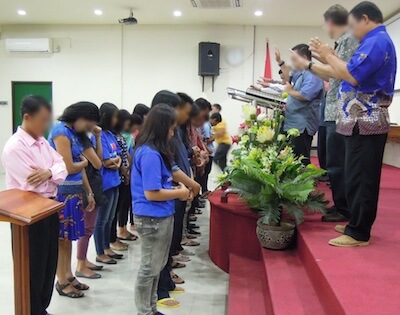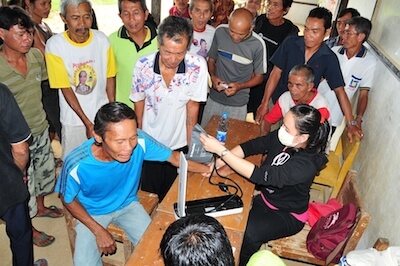Update from Kartidaya
Kartidaya, an Indonesian organisation of the Wycliffe Global Alliance, is currently overseeing Scripture translations into the heart languages of 44 people groups. Another 10 language communities are waiting to have translation started in 2016, with 81 to go to reach 125 languages for Kartidaya’s Vision 2020.
With such a huge challenge before them, their Director, Marnix Riupassa, shares about how it should not be just about numbers, and how transformational impact can be created by working with the local churches.
Why is a holistic approach important in Bible translation and how can it be incorporated into a Bible translation project?
Marnix (MR): A chair always has three or four legs. It’s abnormal to have a one-legged chair. We’ll need to add more legs so that people can sit comfortably on it. I see Bible translation as only one tool and other tools are needed to function together to facilitate transformation. When we look at Bible translation, it’s not just about how we translate the Bible but about the mission to create a fruitful impact. To achieve that, we need something more holistic.
In the past, we tended to be interested in the quantitative outcomes of Bible translation, e.g., how long would it take to translate and how many copies to publish. When a translation was completed, we considered it a success. But Bible translation is more than the result; transformational impact needs to happen. As such, we have to incorporate activities that will help create the momentum for people to use the Bible.
Scripture engagement is one element to bridge between the translated Bible and the language group to bring about transformational impact. Community development is another that can produce fruit. So the question of how we can use Bible translation, Scripture engagement, community development, healthcare, etc., in relation to God’s mission is important, with Bible translation as the foundation upon which the other elements are built for transformation to take place.

Pastors from six language groups pray for the mother-tongue translators and commission them to the task of bringing oral Bible stories to the villages.
How can we help people become aware that getting the Bible translated is not the final goal, but that for fruitful transformation to occur, more must be done to build on that?
MR: There is a Chinese saying: 言教不如身教, which when translated means “action speaks louder than words”. When applied, it means we should not only talk about Kingdom economy, but also show the people how to bring it about. We have to question ourselves if we are starting Bible translation projects so that we can meet Vision 2025 or are we doing translation for the purpose of helping everyone understand their importance in God’s mission? If we are just interested in the numbers, we can use the tools and resources to finish one translation and move on to the next. But remember, the goal of God’s mission is transformation and fruitfulness.
Another aspect of Bible translation is how we can motivate everyone to be a disciple of the Lord. Oftentimes when we talk about discipleship in relation to a community where the majority are non-believers, the first thing we usually do is try to convert them to Christ, after which we attempt to disciple them in the same way we have been discipled. But when the community is not Christian, it is very difficult to evangelise them based on our present paradigm. Instead, we should try to connect with them by starting from their own situation. I call this “love discipleship”, a process where we try to show God’s love in different ways without speaking but through our attitude towards them. Many workers have failed and returned from the receptor country because they tried to reach out from their own paradigm and did not see and begin from the worldview of the communities there. To me, “love discipleship” is one of the characteristics of holistic ministry.

Community services such as medical care help to build bridges to a language community.
How have you tried to introduce the holistic approach and develop ownership by the local language community so that they will be more involved in their translation project?
MR: We are trying to help every community realise that they are the subject, not object, of God’s mission and in the Bible translation project. We do that by encouraging them to creatively use the books that are already translated. For instance, a denomination in eastern Indonesia has completed the translation of the Gospel of Mark. With some words of encouragement from the denominational head at the launch, all their churches are now using the translation in their family fellowship, children’s fellowship and Sunday services. They also initiated activities to engage the whole community during Christmas and Easter. Moreover, the local church funded all such activities and did not depend on government funding or other sources.
In another cluster project where six languages are involved, pastors from all the communities attend the closing ceremonies of each training workshop and together commission the mother-tongue translators to go into the villages with their oral Bible stories. Ownership of the project was further demonstrated when the pastors decided themselves what they wanted to accomplish for the project. In the past, the Bible translator or agency would approach a community and determine what would be done; the community had little say in the matter.
We also tend to equate involvement with financial contribution. From our experience with the cluster project above, they might not have much money but they gave the resources they had. For example, they provided the food and accommodation for the translation workshops and Kartidaya only had to bring the trainers. In another three-language cluster project, one language group committed to help another who had fallen behind in reaching their project outcomes. From these examples, we not only see the community demonstrating greater ownership for their translation project, but also transformational and fruitful impact as a result of engaging with God’s Word in their heart language.
About the Author: Angela Leong is one of the communications staff of Wycliffe Singapore.
This article is originally published in Wycliffe Singapore’s magazine – More than Words, May 2016.

 Thanks for your patience...
Thanks for your patience...